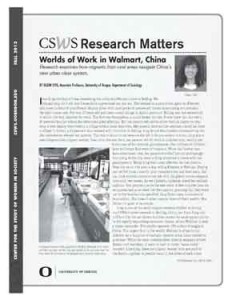 Sociology professor Eileen Otis writes about how migrants from rural areas navigate China’s new urban class system in the latest issue of Research Matters, a publication of the UO Center for the Study of Women in Society. Otis’s paper, “Worlds of Work in Walmart, China,” discusses her experiences interviewing migrant workers in China during her CSWS-funded research last June.
Sociology professor Eileen Otis writes about how migrants from rural areas navigate China’s new urban class system in the latest issue of Research Matters, a publication of the UO Center for the Study of Women in Society. Otis’s paper, “Worlds of Work in Walmart, China,” discusses her experiences interviewing migrant workers in China during her CSWS-funded research last June.
Otis, an associate professor in the UO Department of Sociology, begins her report in a personable way. “I met Ling one day as I was wandering the aisles of a Walmart store in Beijing. We immediately hit it off, and I especially appreciated her dry wit. She worked as a promotion agent for Kleenex and stood in front of a cardboard display piled with multipacks of moistened tissues announcing to customers the day’s tissue sale. She was 17 years old and from a rural village in Anhui province.”
Dr. Otis writes: “China’s urban centers have rapidly stratified and are among the most unequal in the industrialized world. Instead of appealing to the most price-conscious shoppers, as in the United States, Walmart outlets in China are designed to attract the rapidly expanding middle class, selling goods like expensive cognac, fine French wines, rare ginseng, and groceries specifically marketed to allay growing concerns about food safety. Such retail spaces have a pedagogical quality in that they convey new practices associated with an image of ‘the good life,’ for example, with pictures of happy families in domestic contentment surrounded in their comfortable kitchens and living rooms by products for sale on shelves, displayed throughout the stores.”
Ling and other migrant workers like her find themselves living in a new middle class world, Dr. Otis writes, one that Ling “finds alluring for its comforts and distasteful for its waste and inauthenticity.”
The Fall 2013 issue of Research Matters is available online.

